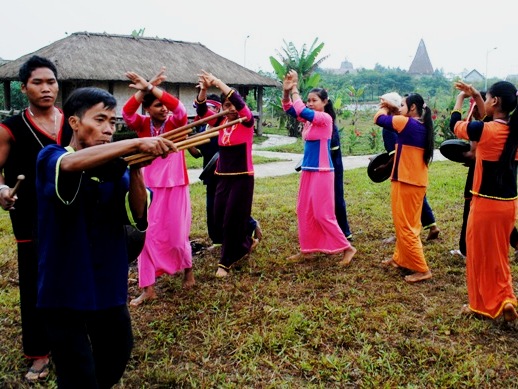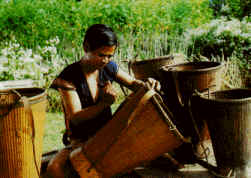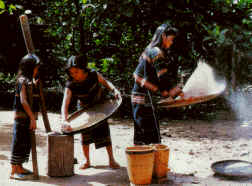The Jrai
06:01 PM 21/01/2016 Views: 6630 PrintWith a 24,000 plus population, the Gia rai live in concentration in Gia Lai province, a part in Kon Tum province and northern Darlac province. They are also called Gio-rai, To Buan, Hobau, Hdrung and Chor. Their language, close to that of the Ede. Cham, Ra-glai and Chu-ru, belongs to the Malayo-Polynesian Group.
The Gia rai believe in the existence of Giang (genies) and hold many rituals connected with genies in production.
They chiefly live on cultivation in burnt-over land and terraced fields. Ordinary rice is the staple food. Farm implements are simple, including machete, cleaver, picks and hoes, and digging stick to put seeds into holes. Livestock-breeding develops, covering cattle, pigs, dogs, and poultry. In former days the Gia-rai possessed a large herd of horses. They also breed elephants. Men are skilful in basketry, and women in cloth weaving. Hunting, gathering and fishing are sideline occupations generating significant economic results.
The Gia rai live in separate villages (polio or bon). There are elongated and small houses, but all are built on stilts with the entrance door facing north. The village chief and the elders have great prestige and play the role of running collective activities. Each village has a communal house called wrong which is the venue of communal activities for young boys before matrimony.
The matriarchal system is adopted. Females are free to choose their lovers and decide their marriage. After wedding, the husband lives in his wife's family and has no right to inheritance. On the contrary, the daughter after marriage no longer lives with her parents and inherits from them. The children take the family name of the mother. In society, men play a more important role but in the house who me n enjoy more priorities. In the old days, a dead man was buried at the same place as those people of his maternal lineage. Today, a dead husband is buried in the same grave as the wife's family.
In folklore, mention should be made of long epics and such old tales as "Darn Di Di San" (Dam Di goes hunting), "Xinh Nha", etc. Remarkable musical instruments include gongs, T'rung, To-nung and Krong-put. These traditional instruments are closely associated with the people's spiritual life. Songs and dances have been performed since childhood and till the old age, when people grow weak they play the role of on-lockers at festivals and ceremonies held in the village or the family.






